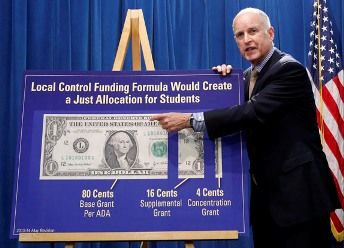Black Caucus brings its clout to CA school funding fight
 The Local Control Funding Formula, enacted in 2013, is supposed to make sure more education dollars are used in ways that specifically help struggling students. Gov. Jerry Brown pushed for the education funding change because he said it was crucial to making millions of mostly minority students into productive citizens helping the California economy. Reformers saw the law as “a historic investment in high-need students.”
The Local Control Funding Formula, enacted in 2013, is supposed to make sure more education dollars are used in ways that specifically help struggling students. Gov. Jerry Brown pushed for the education funding change because he said it was crucial to making millions of mostly minority students into productive citizens helping the California economy. Reformers saw the law as “a historic investment in high-need students.”
However, the Legislative Analyst’s Office surveyed 50 school districts around the state, including the 11 largest, and warned in a January report that not one had proper safeguards to prevent diversion of funds. In Los Angeles Unified, among other districts, the local teachers’ union last summer pointed specifically to new, incoming LCFF dollars as a kitty to tap for pay raises.
In coming months, this issue is likely to emerge as a point of contention in Sacramento because of concerns raised by the California Legislative Black Caucus about State Board of Education rules governing how LCFF funds are used. Here are three of the caucus’ main points:
— Any authority for the use of supplemental or concentration grants to schoolwide and districtwide expenditures must clearly link the services to demonstrated effectiveness in increasing student achievement and closing achievement gaps, and demonstrate that the expenditures are proven effective for “concentrations” of unduplicated children in schools in the district where concentrations exist.
— The terms “most effective” or “effective” should be defined, and at a minimum be tied to demonstrated effectiveness in meeting the “student achievement” goal and closing any persistent achievement gaps or deficiencies as it relates to the unduplicated students, and not just a generic reference to the state priority areas.
— The proposed regulations also do not provide the Board or county superintendents clear standards by which districts must explicitly demonstrate or explain, at a minimum, how expenditures of supplement and concentration grant funds will support services that will actually improve the academic achievement of unduplicated students or close persistent academic achievement gaps.
These concerns are from Assemblywoman Shirley Weber’s remarks to the State Board of Education at its Jan. 16 meeting on behalf of the Black Caucus.
Dan Walters wrote a Feb. 26 column in the Sacramento Bee noting that a “broad coalition of civil rights and education reform groups” had expressed worry about the LCFF not being implemented according to the goals cited in 2013 upon its passage. But this effort seems likely to be much stronger with the aid of state lawmakers.
The Black Caucus has 12 members — Weber, Reginald Byron Jones-Sawyer Sr., Sebastian Ridley-Thomas, Cheryl R. Brown, Autumn Burke, Jim Cooper, Mike Gipson, Christopher Holden, Kevin McCarty and Tony Thurmond in the Assembly, and Isadore Hall III and Holly J. Mitchell in the Senate.
Chris Reed
Chris Reed is a regular contributor to Cal Watchdog. Reed is an editorial writer for U-T San Diego. Before joining the U-T in July 2005, he was the opinion-page columns editor and wrote the featured weekly Unspin column for The Orange County Register. Reed was on the national board of the Association of Opinion Page Editors from 2003-2005. From 2000 to 2005, Reed made more than 100 appearances as a featured news analyst on Los Angeles-area National Public Radio affiliate KPCC-FM. From 1990 to 1998, Reed was an editor, metro columnist and film critic at the Inland Valley Daily Bulletin in Ontario. Reed has a political science degree from the University of Hawaii (Hilo campus), where he edited the student newspaper, the Vulcan News, his senior year. He is on Twitter: @chrisreed99.
Related Articles
Bill gives illegal immigrants access to Medi-Cal
California Democrats have ramped up their push to extend health benefits to in-staters who immigrated unlawfully. High-stakes legislation Sacramento Democrats have advanced a piece of
Buzz returns for Elon Musk’s Hyperloop
Silicon Valley impresario Elon Musk’s Hyperloop transportation concept is back in the news. With a price tag that seemed daunting, especially when
Having no fixed beliefs could pay off for Nathan Fletcher
Sometimes, when lawmakers change parties, it has an obvious logic. When Texas Congressman Phil Gramm, a free-market economist before entering




